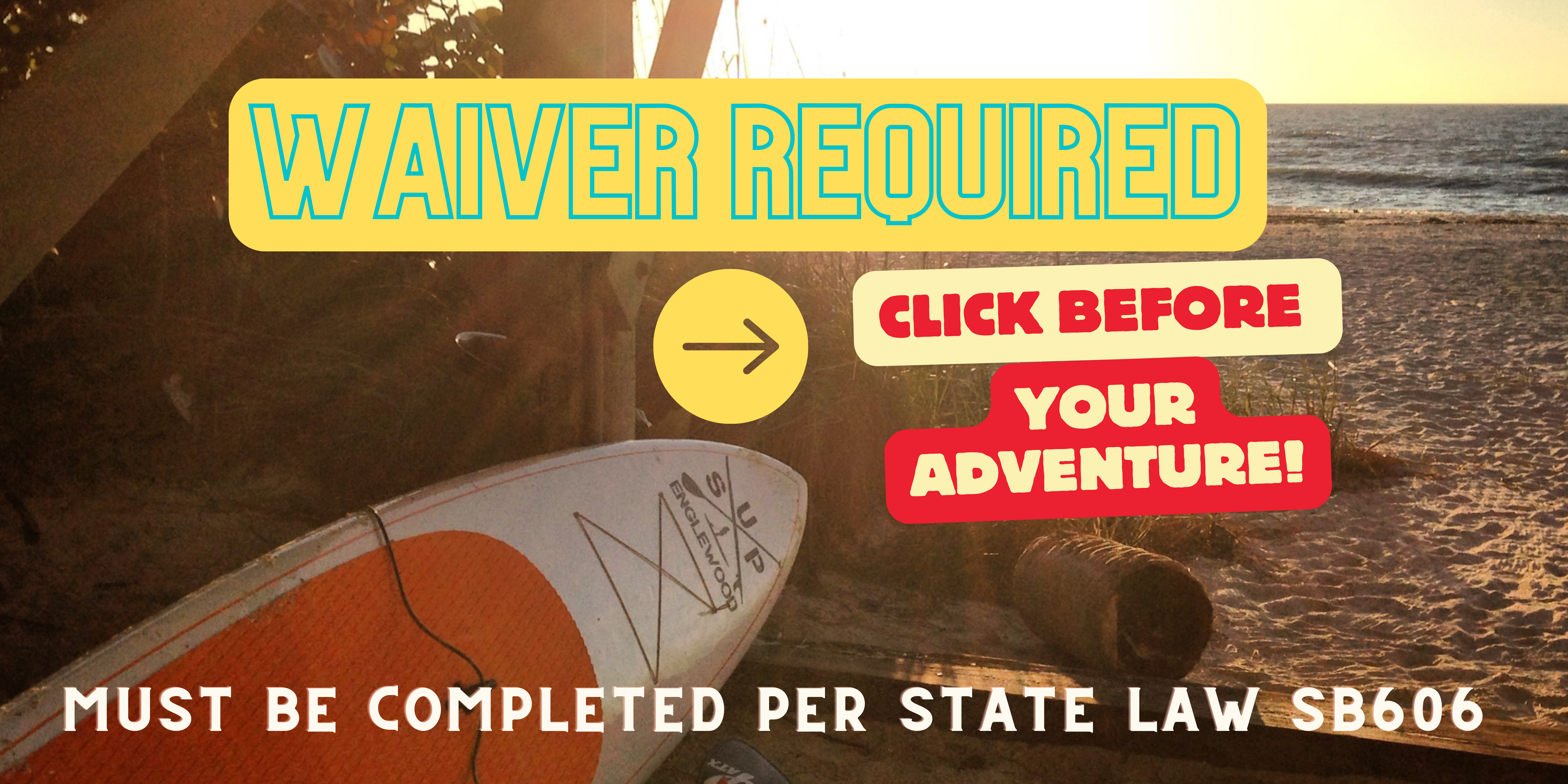As a watersport rental company, SUP Englewood must remain compliant with Florida State laws and regulations. SUP Englewood is required to obtain waivers, provide all participants with pre-ride instruction and FWC’s attestation form. Expect the highest standards when booking with us. Your compliance with the law is essential for a safe experience. Participants on paddle boards or kayaks must adhere to these requirements.
How to Fill out when paddling with minors
A minor cannot sign SUP Englewood waiver forms. Please follow these steps:
- All minors must be listed on a parent/guardian’s waiver form.
- FWC requires that all minors operating their own paddle crafts sign their Pre-Ride Checklist.
- Minors must open the link and use their full name on the form.
- This certifies that they are receiving all safety information prior to launching paddling equipment.
Compliance with Florida Law
It’s important to know about the Florida Boating Safety Act and state boating laws. Especially the rules of the water and navigational aids. For example, the ICW law recently changed and impacts paddlers.
Traffic Rules - How to avoid a collision
Florida IntraCoastal Waterway (ICW); Paddle craft may only operate if there is not another navigable area due to vessel congestion or water obstructions and must proceed with diligence to a location outside of the marked channel. When crossing the marked channel of the ICW, paddlecraft must cross in the most direct, continuous and expeditious manner possible and not interfere with other vessel traffic.
A Video for All Paddlers
Paddle Boarding Tips
Don't Drink & Paddle
Alcohol and many other drugs are especially dangerous when combined with any form of boating. Do not operate any boat, even one without a motor, while impaired by alcohol or drugs. Drinking and paddling is considered boating while intoxicated. The Florida Boating Safety Act of 2022 brings stronger enforcement and fines for violations.
Stay visible and alert
Most boating accidents involve collisions due to operator inattention or carelessness. Be aware of dangers approaching from any direction.
Know Your Limits
Boating in any manually propelled boat (such as canoes, kayaks, rafts and rowboats) can be physically challenging. Be careful not to overestimate your physical capabilities or those of the boat you will be using.
Wind & Tides
Stay aware of hazards such as wind, water currents and tidal flow that can make it very difficult to reach your intended destination. Pay extra attention to weather, since storms bring lightning and high waves. Avoid boating in poor weather conditions.
Follow the Rules
The rental company has rules aimed at protecting you and your passengers. Understand and follow the rental company’s rules and the boating laws that apply to the type of boat you are renting.
How to steer a kayak
You should know how to safely operate a kayak before venturing solo. If it’s your first time follow these steps on how to go forward, backwards, and stop. We’ll review everything by the water and make sure you have this down before venturing away from the kayak launch.
Stay hydrated and sun protected
Hydration and sun protection are important issues. Take drinking water, wear sunblock, polarized sunglasses and a hat.
Essential Safety Gear
In addition to these recommendations, SUP Englewood advises to always bring communication with you. It’s helpful to communicate with us as the rental company or call 9-1-1 if needed in an emergency.
Manatee Awareness
Moments with wildlife can be amazing and humbling. Ensure that you’re safe while paddling and limit your impacts to the the environment by giving marine mammals space. Learn more about manatee viewing guidelines. As there is state and federal laws protecting marine mammals.
Plan Your Trip
Map out your course and decide how long you plan to spend paddling, and how many miles you want to complete. Check the weather, winds, and tides. Check to see if the predictions match your goals. You may need to adjust your plan based on predictions. Always check conditions on-site to ensure the predictions are correct.
What if you flip a kayak?
Paddlecraft and other non-motorized boats have a tendency to be less stable than larger boats. It is important not to overload the boat, to keep at least three points of contact and to stay low in the boat to improve balance.
How to self-rescue on a Paddle Board
Falling is part of the sport and practice will help you to remain calm. Practicing the steps to self-rescue will also allow you to react more quickly in an emergency situation.
Use this webpage to review helpful safety tips
How to Fill out when paddling with minors
All minors must be listed on a parent/guardian’s waiver form. Minor’s cannot sign legal documents. Therefore, minors cannot sign SUP Englewood waiver forms. FWC requires that minor’s operating their own paddle crafts sign the Pre-Ride Checklist.
References
This safety information is complied by valuable resources and is required by state law SB606. The Florida Boating Safety Act of 2022 is regulated by FWC. Manatee awareness is a regulation of federal and state laws. Learn more at Save the Manatee Club’s website. Videos provided by NASBLA Safer Paddling Series.
Wear a life jacket
Always wear your life jacket and know what to do if you unexpectedly end up in the water. Stay calm and stay with the boat if possible. If you fall out in a swift current, keep your feet on or near the surface and swim to shore. There you can dump the water out of the boat, re-enter and be on your way.


